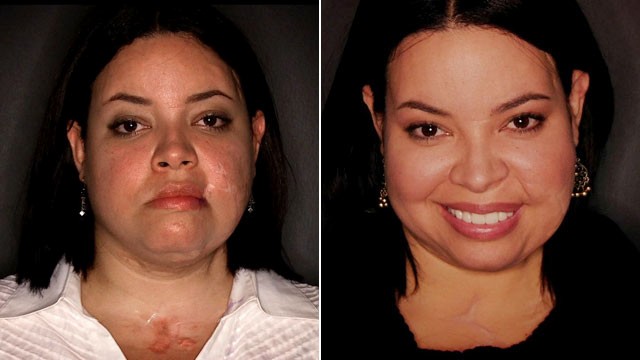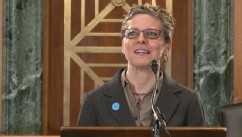Ilianexy Morales was in her 20s when she met a man outside her home in New York City as he was asking for directions. He was older, 38, but doting and generous, and they began dating exclusively.
He encouraged her to quit her job as a medical assistant and began to support Morales, her 4-year-old daughter and bedridden mother. But soon, his attentiveness turned to possessiveness and obsessive demands. She had to ask permission to leave the house and he would spy on her at school.
"There was no violence, but other things, like control issues, jealousy ... like who I would talk to," she told ABCNews.com.
That would change. Three years into the oppressive relationship in 2005, when Morales tried to break up with him, he cajoled his way into her apartment and stabbed her more than 100 times with a butcher's knife, partially severing her arms and nearly decapitating her, she said.
Morales survived after a month in a coma and seven initial surgeries -- one to reattach her arms -- and her former boyfriend is now serving a 15-year sentence for assault with a deadly weapon, she said.
But she was left with horrendous scars all over her body, especially on her face.
Riddled with anxiety, she couldn't even look herself in the mirror. "I didn't look like me," Morales, 30, said. "I would hide a lot. I felt really ashamed of myself even though it was not my fault."
But in 2010, Face to Face, a program based in Alexandria, Va., gave Morales her face and her strength and her dignity back.
The charitable arm of the American Academy of Facial, Plastic and Reconstructive Surgery (AAFPRS), Face to Face provides about 1,500 surgeries a year to women in need in its National Domestic Violence Project.
"Ilianexy was critically injured," said Dr. Andrew Jacono, a New York City facial and reconstructive surgeon who took her case. "It wasn't just a simple scar. She was almost stabbed to death. She probably would have been killed if he wasn't stopped by a neighbor. He was going to finish her off."
Jacono donated his skills to perform seven hours of complicated "flap surgery" on her face and neck. The outcome was "beautiful," he said. "She's a wonderful person with an amazing spirit. It gave her a lot of confidence."
"It's really gratifying to help these women," he said. "Unfortunately, people don't realize how common domestic violence is in this country."
An estimated 1.3 million American women are victims of physical assault by an intimate partner each year, about one in every four women, according to the National Coalition Against Domestic Violence. Women like Morales, aged 20 to 40, are at the greatest risk
Jacono has since reconstructed the faces of women who have had acid thrown in their faces and those who are scarred by gunshot wounds. He was inspired to join Face to Face after doing a successful rhinoplasty on a young patient in 1998. She had told him her broken nose was the result of a car accident.
But three months later, the patient contacted him again. "She was crying hysterically, the nose was crooked and collapsed again," he said. "She revealed that her husband had done it in the first place. It affected me very much."
Face to Face's domestic violence project was launched in 1994 after public outrage over the O.J. Simpson arrest and murder trial. Even though Simpson was exonerated, the organization made a large donation to the Nicole Brown Foundation.
Until then, the group offered surgical services in developing countries, which they still continue today.
The board reasoned that battered women had many support services available to them for vocational and psychological rehabilitation, but not the surgery that is "the final piece in their rehab, allowing them to erase the memories of abuse physically from their faces."
The American Academy of Facial, Plastic and Reconstructive Surgery also encouraged the cosmetic dentistry group to get involved because if was receiving so many women with broken teeth.
Doctors work with local shelters and psychotherapists to find women who cannot afford surgical services and associated facility and anesthesia fees. To qualify, they need to have undergone therapy and been outside of an abusive relationship for a significant period of time.
"We want to make sure that the patient is out of the cycle of violence," said Dr. Ed Williams, a facial plastic surgeon and clinical professor at Albany Medical College in New York, who has been involved with the domestic-violence program since its inception.





No comments:
Post a Comment